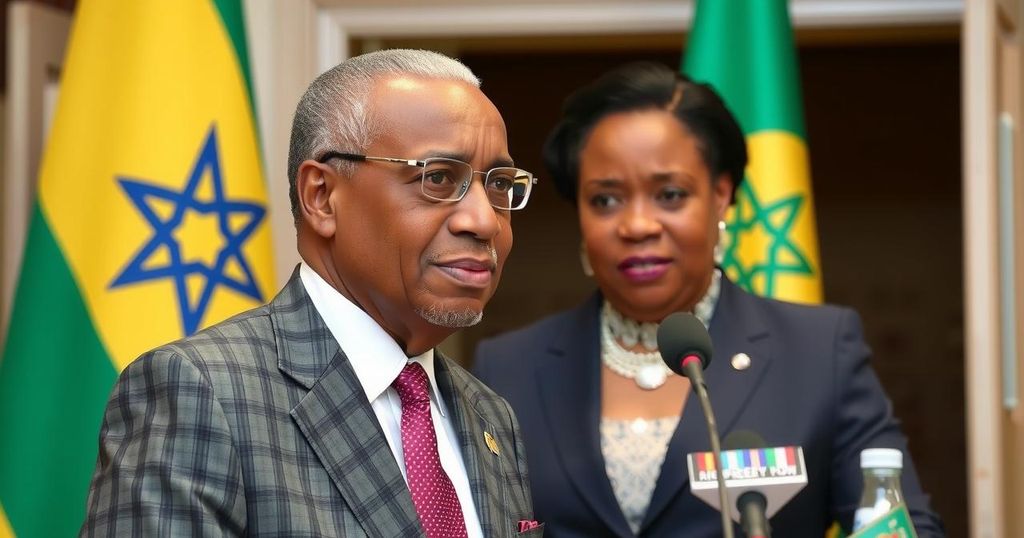Somalia’s President Hassan Sheikh Mohamud will visit Ethiopia to reinforce a peace deal that aims to alleviate regional tensions. This follows Ethiopia’s contentious relationship with Somaliland. Despite the peace agreement brokered by Turkey, uncertainties regarding Ethiopian sea access and its previous dealings with Somaliland persist, while Egypt, Eritrea, and Somalia strengthen their alliance against Ethiopia.
On Saturday, Somalia’s President Hassan Sheikh Mohamud is scheduled to visit Addis Ababa, Ethiopia, as both nations strive to enhance their newly signed peace agreement aimed at addressing escalating tensions in the Horn of Africa. This visit is deemed significant following Ethiopia’s previous engagement with Somaliland, which infuriated Somalia owing to concerns over Ethiopia’s expanding territorial claims and interests along the Red Sea coastline.
The recent peace accord, mediated by Turkey, has marked a turning point in diplomatic relations between Somalia and Ethiopia. Mohamud’s office confirmed that his visit, requested by Ethiopian Prime Minister Abiy Ahmed, represents a commitment to ongoing collaboration, highlighting a new diplomatic chapter between the two nations. The statement articulated that, “This visit builds on the recent agreement reached in Ankara. This renewed cooperation underscores a new era of collaboration between Somalia and Ethiopia.”
However, several pertinent issues remain unaddressed. The Turkish government has suggested that Ethiopia might eventually secure some degree of sea access as a result of the agreement; however, the specifics of this arrangement are still ambiguous. Moreover, the status of Ethiopia’s previous agreement with Somaliland is uncertain, contributing to continued tensions within the region.
In a related development in Cairo, Somalia’s Foreign Minister Ahmed Moalim Fiqi convened meetings alongside his Egyptian and Eritrean counterparts, underscoring combined concerns regarding Ethiopia’s influence. Egypt’s Foreign Minister Badr Abdelatty articulated a critical stance towards external forces in the Red Sea, asserting, “The Red Sea and its security is subject only to the will of the countries on its coast, and it is absolutely unacceptable for any country not bordering the Red Sea to have a presence, whether military, naval or otherwise.” Moreover, Egypt, Eritrea, and Somalia have cultivated a closer alliance, focusing on shared challenges posed by Ethiopia, which has additionally led to strengthened military collaboration between Egypt and Somalia to counter insurgent threats within Somali territory.
The complexities surrounding Ethiopia’s aspirations for coastline access, combined with regional geopolitical dynamics, could influence the broader stability of the Horn of Africa.
The article discusses the diplomatic relations between Somalia and Ethiopia, especially in light of a recent peace deal aimed at mitigating tensions in the Horn of Africa. Historically, Ethiopia has faced difficulties regarding access to the sea—a situation that has fostered resentment among its neighbors, particularly Somalia. The signing of an agreement between Somalia and Ethiopia, mediated by Turkey, represents a critical effort to improve relations following Ethiopia’s contentious agreement with Somaliland, which heightened regional tensions.
In conclusion, the upcoming visit of Somalia’s President to Ethiopia highlights a crucial step towards strengthening diplomatic ties following a recent peace agreement. However, lingering uncertainties regarding Ethiopia’s relationship with Somaliland and its aspirations for some form of sea access remain significant challenges. The future stability of the region will depend on how these countries navigate their complex relationships and external influences affecting the Horn of Africa.
Original Source: thedefensepost.com






